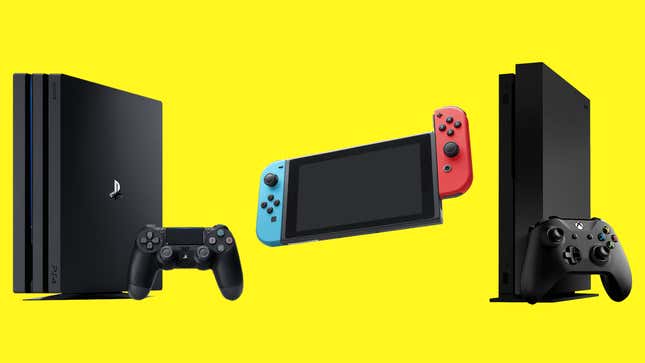
It took months of anticipation and a long game of chicken with Sony, but Microsoft finally pulled back the curtain on next-gen price points this week. The Xbox Series X, with its 12 teraflops and fridge-in-a-supervillain-lair design, will retail for $499. Meanwhile, the disc-less, all-digital Xbox Series S—which was first reported last year but only officially confirmed just this week following a late-night leak—clocks in at $299. Both consoles will release on November 10.
Of course, a price tag can make or break a console’s launch. We all saw Sony get memed to oblivion with that “$599” line from E3 2006. (The truth is that only one model of the PS3, the one with the 60GB hard drive, launched at $599. A 20GB version was available for $100 less.) Seven years later, the company followed that debacle with the PS4, which launched with a markedly lower price tag than the PS3 and went on to become the fastest console to sell through 100 million units.
So, how do the prices of Microsoft’s next-gen offerings stack up? To compare, we tracked down the price points of all major consoles from the big three (Microsoft, PlayStation, Nintendo), dating all the way back to the original Xbox, the first PlayStation, and, of course, the one and only Nintendo Entertainment System.
First, a couple of ground rules: In addition to sticker price, we also pinpointed the price adjusted for inflation, calculated by the U.S. Inflation Calculator and rounded up to the nearest dollar. (With that figure in mind, the Xbox Series X is cheaper at launch than both the Xbox One and Xbox 360.) For consistency’s sake, we used the North American release date of the base console, rather than any packaged deals. We also weighed the internal storage options for each machine, since that metric has often been the main signifier for cost differential between models. The Xbox One S launched in August 2016, for instance, with three different models (500GB, 1TB, and 2TB) at three different price points ($299, $349, and $399). Shall we?
Xbox
Xbox (2001): $299
Xbox 360 (2005): $399
Xbox 360 Arcade (2007): $279
Xbox 360 Elite (2007): $479
Xbox 360 S 4GB (2010): $199
Xbox 360 2 250GB (2010): $299
Xbox One (2013): $499
Xbox One S (2016): $299
Xbox One S 1TB (2016): $349
Xbox One S 2TB (2016): $399
Xbox One X (2017): $499
Xbox Series S (2020): $299
Xbox Series X (2020): $499
Now, let’s adjust that for inflation:
Xbox (2001): $438
Xbox 360 (2005): $529
Xbox 360 Arcade (2007): $349
Xbox 360 Elite (2007): $599
Xbox 360 S 4GB (2010): $236
Xbox 360 2 250GB (2010): $355
Xbox One (2013): $555
Xbox One S (2016): $323
Xbox One S 1TB (2016): $377
Xbox One S 2TB (2016): $431
Xbox One X (2017): $527
Xbox Series S (2020): $299
Xbox Series X (2020): $499
PlayStation
PlayStation (1995): $299
PS2 (2000): $299
PS3 20GB (2006): $499
PS3 60GB (2006): $599
PS3 Slim 120GB (2009): $299
PS3 Slim 160GB (2010): $299
PS3 Slim 320GB (2010): $399
PS3 Super Slim (2012): $269
PS4 (2013): $399
PS4 Pro (2016): $399
PS4 Slim 500GB (2016): $299
PS4 Slim 1TB (2017): $299
PS5 (2020): Hey, it’s anyone’s guess!
Adjusted for inflation, those figures are:
PlayStation (1995): $508
PS2 (2000): $450
PS3 20GB (2006): $641
PS3 60GB (2006): $770
PS3 Slim 120GB (2009): $361
PS3 Slim 160GB (2010): $355
PS3 Slim 320GB (2010): $474
PS3 Super Slim (2012): $304
PS4 (2013): $444
PS4 Pro (2016): $431
PS4 Slim 500GB (2016): $321
PS4 Slim 1TB (2017): $316
PS5 (2020): Seriously, we’re just as shocked as you are that Sony hasn’t revealed anything.
Nintendo
NES (1985): $129*
SNES (1991): $199
N64 (1996) $199
GameCube (2001): $199
Wii (2006): $249
Wii U 8GB (2012): $299
Wii U 32GB (2012): $349
Switch (2017): $299
Switch Lite (2019): $199
*paired with two controllers and Super Mario Bros.
When you adjust Nintendo’s ticket prices for inflation, here’s what you get:
NES (1985): $311
SNES (1991): $379
N64 (1996) $329
GameCube (2001): $291
Wii (2006): $320
Wii U 8GB (2012): $337
Wii U 32GB (2012): $394
Switch (2017): $316
Switch Lite (2019): $201
Correction, 4:30 p.m.: An earlier version of this article misstated the launch price for the SNES. Kotaku regrets the error.